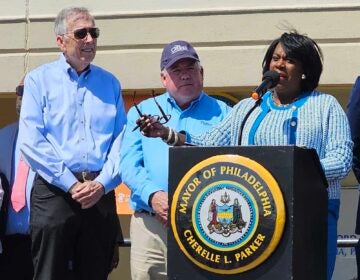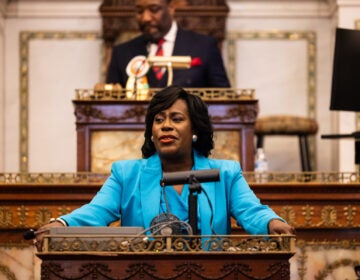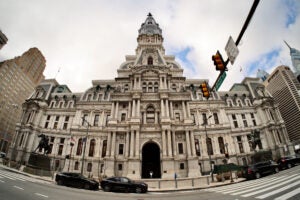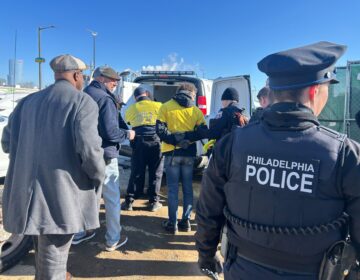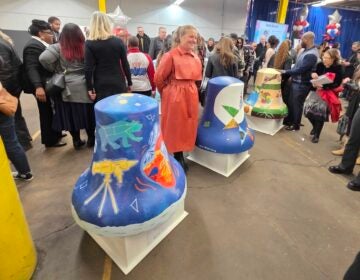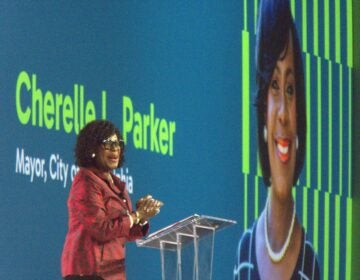What’s in Philly Mayor Parker’s second budget proposal for cleaning and greening
The plan includes expanding twice-weekly trash pickup to North Philly, fixing heating and air conditioning in libraries and adding planters to commercial corridors.
Listen 1:01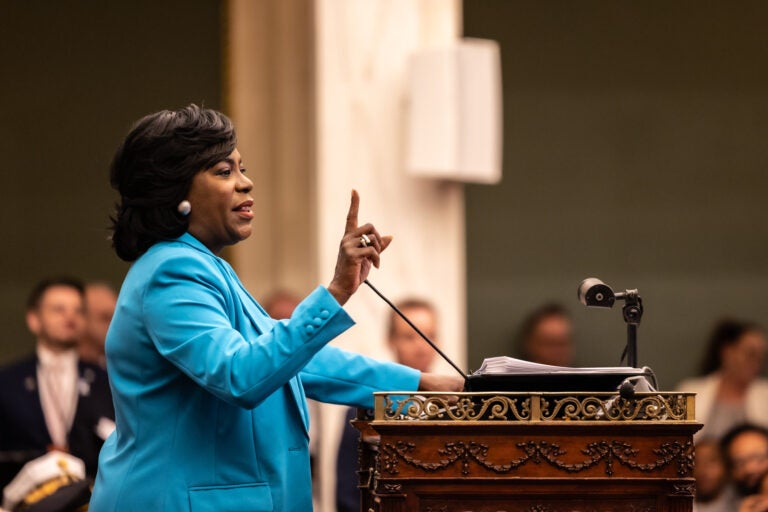
Philadelphia Mayor Cherelle Parker delivered her second budget address on March 13, 2025. (Kimberly Paynter/WHYY)
Have a question about Philly’s neighborhoods or the systems that shape them? PlanPhilly reporters want to hear from you! Ask us a question or send us a story idea you think we should cover.
In her second budget proposal, Mayor Cherelle Parker is pitching money for heating, ventilation and air conditioning in city facilities, tree pruning, electric vehicle chargers, maintenance of turf and landscaping at city parks and a new anti-litter task force.
Parker has repeatedly promised to make Philly the “cleanest, greenest big city in the nation.”
“Residents … tell me they can see and feel the difference,” Parker said in her budget address before City Council on Thursday. “We’re just getting started.”
Parker’s proposed spending plan includes nearly $15 million in new “Clean & Green” investments in the 2026 operating budget, according to a breakdown provided by finance and budget officials during a press briefing Wednesday.
It’s a smaller sum than the $36 million in new “Clean & Green” operating investments she proposed last year, which included an expansion of the Taking Care of Business corridor cleaning program, a new cleaning program in residential areas, increased enforcement against illegal dumping through more surveillance cameras, a twice-weekly trash pickup pilot in some parts of the city, new curbside pickup of bulky items and new trash cans. But Parker said the initiatives started under her first budget won’t go away.
“The gameplan going forward is to expand them and make them more effective,” she said.
Money for planters, vacant lot cleaning and addressing dumping in parks
Parker said Thursday that the city plans to create a 10-point greening plan that could include tree planting, vacant lot cleaning, park improvement and support for community gardens. The plan would be implemented in partnership with nonprofits, community groups and philanthropic organizations, she said.
She said the city plans to launch an anti-litter task force to coordinate enforcement of anti-litter and dumping laws across city government and expand twice-weekly trash collection — which some residents have criticized as ineffective — to North Philly.
The budget address follows two City Council hearings last week where advocates called for a stronger focus on preventing illegal dumping and maintaining the city’s tree canopy.
The mayor is proposing $250,000 in additional funding for tree pruning ahead of the 2026 special events, $1 million in additional funding per year for the Department of Parks and Recreation to maintain turf and landscaping and millions of dollars for the purchase and maintenance of new planters along neighborhood commercial corridors.
“These will beautify our streets while helping to improve traffic safety,” Parker said. “If they can work in Center City and Chestnut Hill, we deserve them all over the city.”
To combat litter and illegal dumping, the budget proposal includes $8.5 million over five years for the Pennsylvania Horticultural Society to continue its cleaning of vacant lots, $2.5 million over five years for the District Attorney’s Office to support the Clean & Green Task Force, $750,000 per year for Clean & Green initiatives within the Department of Sanitation, more than $300,000 for a “trash and recycling cart container pilot” and $130,000 for Parks and Rec to address illegal dumping.
The mayor’s new “Clean & Green” proposals also include $75,000 per year for an environmental justice position within the Office of Sustainability, $200,000 for flood resilience planning in Eastwick, $175,000 for Clean Water Act compliance planning and $250,000 per year in additional operating support for the Philadelphia Energy Authority.
The budget comes amid a dramatic rollback of environmental efforts at the federal level. The U.S. Environmental Protection Agency announced Wednesday it planned to terminate the environmental justice arm of the agency.
Money for accessible curb cuts and repaving
Finance and budget officials said the biggest chunk of proposed new capital investments next fiscal year — over $122 million — would go toward the “Clean & Green” agenda. But this total is driven by a $50 million investment in repaving and curb cuts that are in compliance with requirements set by the Americans with Disabilities Act proposed for next fiscal year. The city is required to build or remediate a certain number of ADA-compliant curb cuts under a 2022 settlement with disabled residents and disability rights advocates, who sued the city over its inaccessible curb cuts and sidewalks.
Capital investments in air conditioning, EV chargers and LED lighting
Parker’s budget plan includes money for HVAC upgrades at several city facilities, including adding air conditioning at the Detention Center in Northeast Philadelphia and HVAC improvements at two city-run health centers and two Office of Homeless Services facilities, according to city budget and finance officials. It also includes close to $4 million for a facilities condition assessment and HVAC design and replacement projects at libraries, which frequently close due to inadequate air conditioning and heating.
Parker’s plan also includes more than $7 million for building improvements at rec centers, which advocates say need more funding and attention for maintenance, and more than $1 million to design and install electric fueling infrastructure, LED lighting and building automation systems at city facilities through the Office of Sustainability. She’s proposing $28 million for the Department of Fleet Services to install electric fueling infrastructure at three fueling stations and buy dozens of vehicles including trash compactors, medic units and fire trucks.
Financial uncertainty driven by federal actions
The city’s finances face “heightened risks” due to a variety of factors, including inflation, a tight labor market, the end of federal pandemic relief funds and current “federal and economic uncertainties,” budget officials said.
President Donald Trump ordered federal agencies to pause grant payments under the climate-focused Inflation Reduction Act and the Infrastructure Investment and Jobs Act. A federal judge ruled to block the funding freeze, but some EPA grantees have continued to report their federal funding is suspended.
“I know there is uncertainty in the air right now,” Parker said. “People don’t know what to expect from their government, and uncertainty can breed fear. I want the people of Philadelphia and our city employees to hear me — your city is here to keep you safe and to safeguard your basic rights.”
Budget officials said Wednesday that the city lost a federal grant related to sustainability, but did not specify what the grant paid for. During a City Council hearing last week, officials in the Department of Parks and Recreation said the city was unable to access a $12 million grant from the U.S. Department of Agriculture to help the city and its nonprofit partners implement the Philly Tree Plan.
Parks & Rec is on track to plant 15,000 over five years, despite the “freeze in federal funding” potentially frustrating those efforts, according to Parker administration officials.
The city also received a government-to-government grant under the Inflation Reduction Act to develop a framework for institutionalizing environmental justice within city government, create an environmental justice map, and develop resilience to flooding in Eastwick and heat in the city.
Genevieve LaMarr LeMee, deputy director of environmental justice in the city’s Office of Sustainability, said in an interview before the mayor’s budget proposal that while some of the office’s federal grants have moved from “active to inactive and back,” officials are operating business-as-usual where the city has a signed grant agreement with the federal government. She acknowledged that “things are changing very quickly” at the federal level.
“A lot is in flux,” she said. “If things freeze, unfreeze, we’re continuing to move forward with our work for now.”
The mayor’s administration and City Council will negotiate the budget over the coming months. Council must approve the budget before the start of the next fiscal year July 1.

Subscribe to PlanPhilly
WHYY is your source for fact-based, in-depth journalism and information. As a nonprofit organization, we rely on financial support from readers like you. Please give today.




